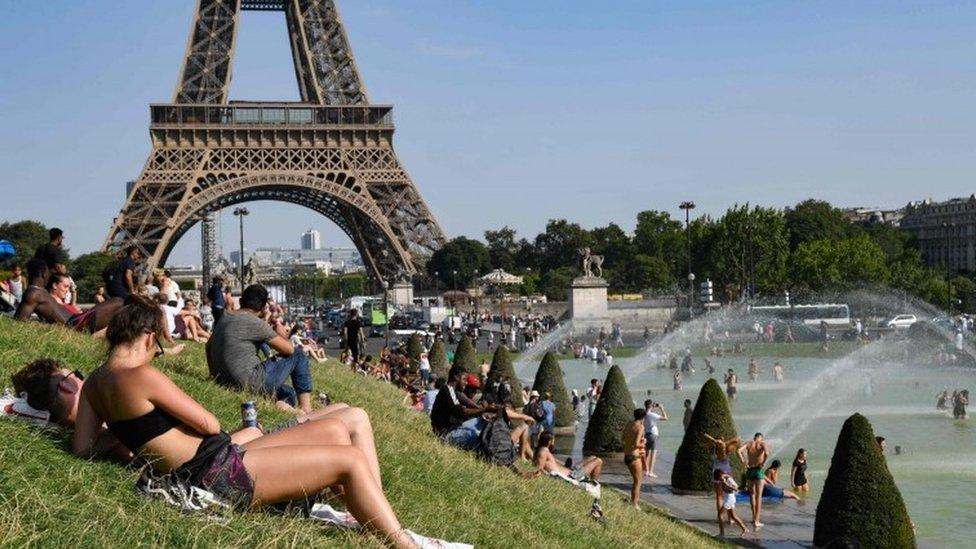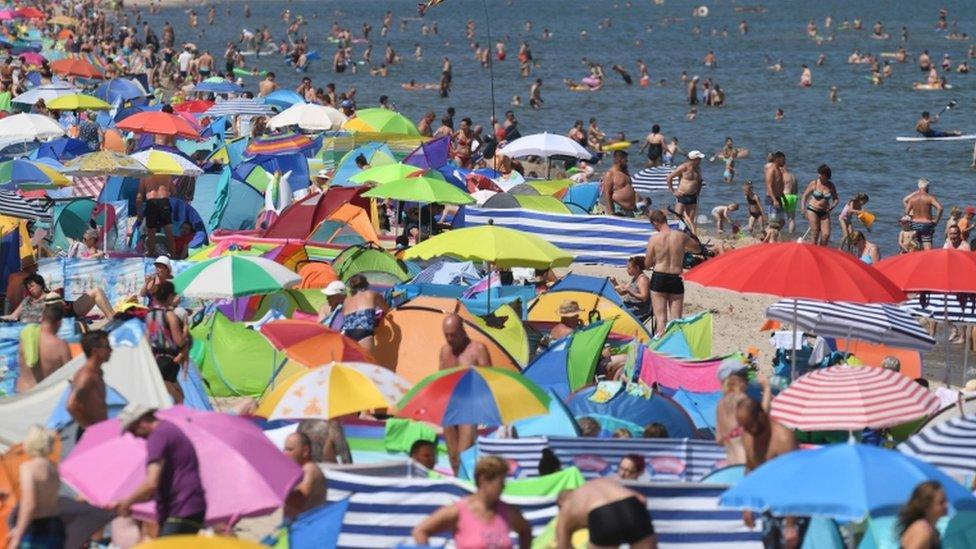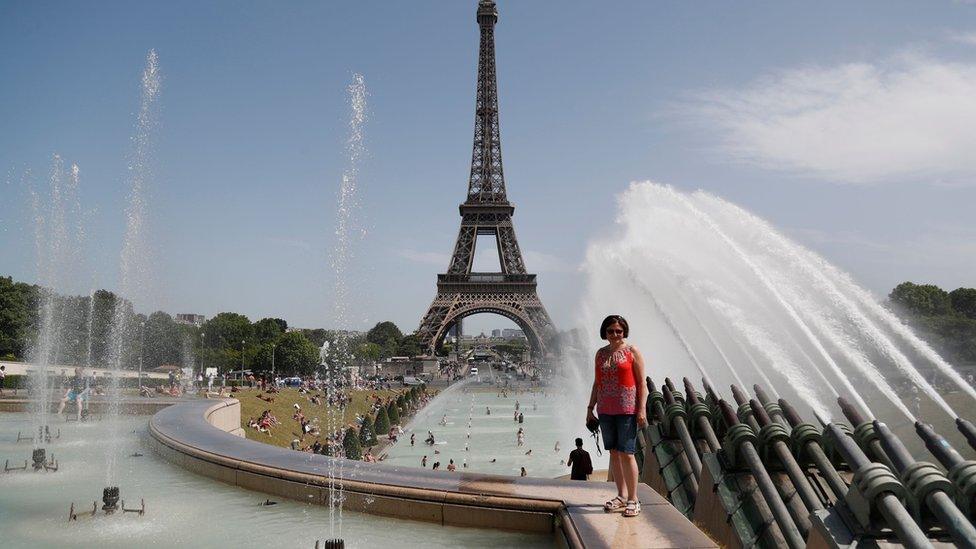Europe heatwave: Records tumble in Belgium, Germany and the Netherlands
- Published
Eurostar passengers felt the heat in Belgium
Belgium, Germany and the Netherlands have recorded their highest ever temperatures, in a heatwave searing Western Europe.
The Belgian town of Kleine Brogel hit 39.9C (102F), the hottest since 1833.
The southern Dutch city of Eindhoven beat the 75-year-old national record, with a new high of 39.3C.
Germany's weather service said a new record of 40.5C - just 0.2C higher - had been set in Geilenkirchen, near the Belgian and Dutch borders.
The new German record was still to be confirmed, it said, warning that it could get even hotter on Thursday.
Amid the sweltering temperatures, a Eurostar train broke down, trapping passengers.
Elsewhere, French reports suggested five deaths might have been linked to the heatwave.
The highest temperature recorded in Paris - 40.4C in 1947 - is expected to be surpassed on Thursday.

Temperature records are expected to be broken in Paris
Luxembourg is on red alert for the south and the capital - with temperatures possibly climbing higher than 40C on Thursday.
In Portugal, hundreds of firefighters extinguished a forest fire that had been plaguing the Castelo Branco region for days - though fires are not unusual during the summer season.
What happened on the Eurostar?
At least 600 passengers were stuck on the train near the Belgian town of Halle for two hours, with some of the carriages left in the dark inside a tunnel and others outside in the sun.
"The temperature was sky high. It was very bad," Jan Willem Wiersma from Rotterdam told the BBC. "We're happy to be off the train, where it's 15 degrees less."
Kris Hoet, who was travelling from Antwerp to London, said he and others had been stuck on the train for two hours before being allowed to get off.
Eurostar said the fault was down to an overhead power supply, and it advised people not to travel if possible on Wednesday. Other services between Brussels and Paris were caught up in the breakdown.
Where was it hottest?
Germany had issued heat alerts for the entire country. By sunset, it announced at least 10 stations had reported temperatures above 39C - including ones in Cologne and Bonn, and Saarbrücken, all of which lie in the west of the country near the border.

Beachgoers at Zinnowitz on the island of Usedom in the Baltic Sea, northern Germany
The Dutch record was initially broken with 38.8C at Gilze-Rijen airbase on Wednesday, before a higher temperature was recorded in Eindhoven.
The hottest areas were in the Dutch province of Brabant and across the Belgian border in the Flemish province of Limburg.
In Kleine Brogel, the record was broken early in the afternoon at 38.9C but the temperature continued to climb to 39.9C by 17:00 (15:00 GMT).
Belgium has issued a code red weather warning for the whole country.
Allow X content?
This article contains content provided by X. We ask for your permission before anything is loaded, as they may be using cookies and other technologies. You may want to read X’s cookie policy, external and privacy policy, external before accepting. To view this content choose ‘accept and continue’.

A big bridge at the Dutch port of Rotterdam was being sprayed to prevent the metal expanding in the heat.
Much of France was also sweltering. La chaîne météo reported that the temperature in several areas had climbed above 40C. Pont-la-Ville in the eastern area of Haute-Marne reached 41.2C while Vassincourt to the north-east reached 40.5C.
Thursday could see 42C in the French capital.
Authorities launched a red alert in the Paris region and 19 other French departments, calling for "absolute vigilance", and comparisons were drawn to a heatwave in August 2003, during which heat contributed to almost 15,000 deaths.


Spain declared a red alert in its Zaragoza region, which was hit by devastating wildfires last month. The European Commission's Copernicus Climate Change Service says the risk of wildfires is high in Spain and in Portugal
In the UK, temperatures are predicted to exceed 35C, and could be the highest ever recorded
Hasn't the summer already been hot?
Yes, an intense heatwave swept through areas of Europe last month, making it the hottest June on record.
BBC colleagues from hot countries give their tips for staying cool
France set an all-time high-temperature record of 46C, external, according to the WMO, and new June highs were set in the Czech Republic, Slovakia, Austria, Andorra, Luxembourg, Poland and Germany.
Is climate change to blame?
Linking a single event to global warming is complicated. While extreme weather events like heatwaves occur naturally, experts say these will happen more often because of climate change.
Records going back to the late 19th Century show that the average temperature of the Earth's surface has increased by about one degree since industrialisation.
A climatology institute in Potsdam, Germany, says Europe's five hottest summers since 1500 have all been in the 21st Century.
Scientists are concerned that rapid warming linked to use of fossil fuels has serious implications for the stability of the planet's climate.
- Published28 June 2019

- Published25 July 2019

- Published25 June 2020

- Published2 July 2018
